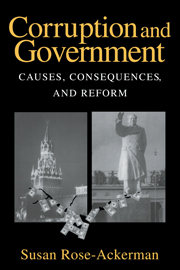Book contents
- Frontmatter
- Contents
- Preface
- 1 Introduction: The Costs of Corruption
- Part I Corruption as an Economic Problem
- Part II Corruption as a Cultural Problem
- Part III Corruption as a Political Problem
- Part IV Achieving Reform
- 10 The Role of the International Community
- 11 Domestic Conditions for Reform
- 12 Conclusions
- References
- Name Index
- Subject Index
10 - The Role of the International Community
Published online by Cambridge University Press: 05 June 2012
- Frontmatter
- Contents
- Preface
- 1 Introduction: The Costs of Corruption
- Part I Corruption as an Economic Problem
- Part II Corruption as a Cultural Problem
- Part III Corruption as a Political Problem
- Part IV Achieving Reform
- 10 The Role of the International Community
- 11 Domestic Conditions for Reform
- 12 Conclusions
- References
- Name Index
- Subject Index
Summary
Corruption is an emerging priority for the international community. The end of the Cold War has changed the balance of forces and removed any compelling need to support corrupt regimes for national security reasons. The widespread corruption and organized crime influence in the former Eastern bloc have made the problem difficult to ignore – as have similar problems in other parts of the world. The global move to privatize and deregulate requires a rethinking of the relationship between the market and the state – including a recognition of the new corrupt opportunities created by these efforts to strengthen the role of the private market.
Some observers question this new interest by international organizations. They view corruption as a domestic political problem that should be left to individual countries. To these critics, outsiders' reform efforts represent an unacceptable attempt to impose “Western” values. But many scholars from developing countries argue that this fashionable critique is based on a mischaracterization of local practices. They make it clear that traditions of gift giving do not translate into widespread acceptance of corrupt practices (Ayittey 1992). Citizen surveys and expressions of public outrage suggest that widespread tolerance of corruption is not common (Cooksey 1996; Geddes 1994: 25–26; Pasuk and Sungsidh 1994).
Some developed countries resist efforts to control corruption because they believe that payoffs in developing countries benefit their own domestic businesses. Westerners can hardly claim that their own cultures find corruption acceptable.
- Type
- Chapter
- Information
- Corruption and GovernmentCauses, Consequences, and Reform, pp. 177 - 197Publisher: Cambridge University PressPrint publication year: 1999

